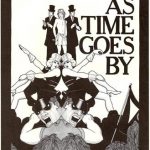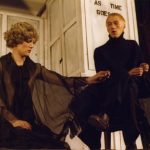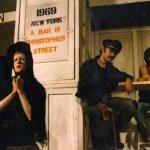Company Name: Gay Sweatshop Theatre Company
CHE Conference Southampton
Writer: Noel Greig and Drew Griffiths
Music: Alex Harding
Director: Drew Griffiths
Designer: Paul Hart
Cast: Gordon MacDonald, Alan Pope, Drew Griffiths, Philip Howells
Year: 1976
CHE Conference, Nottingham and tour
Writers: Noel Greig and Drew Griffiths
Music: Alex Harding
Director: Noel Greig
Designer: Paul Hart
Cast: Gordon MacDonald, Alan Pope, Philip Timmins, Philip Osment, Martin Panter, Drew Griffiths, Noel Greig
Stage Manager: Peter Charles
Year: 1977
As Time Goes By was collaboratively written by Noel Greig and Drew Griffiths, with the intention of writing a play that would have an epic quality. The play was divided into three parts. The first part was set in late-Victorian England, the second in Berlin in the early 1930s and the last just before the Stonewall Riots of 1969.
The play aimed to explain contemporary hostility towards homosexuals by showing the influences and attitudes that had created such animosity. It presented the class divisions of the Victorian era and the wish to continue the industrial production with an obedient workforce. It showed the lauded values of the traditional family as the foundation of society, and how this was manipulated to control the population. In the section set in post WWI Germany, it showed the rise of the fascist regime and its impact on liberal values. At the time it was common for homosexuality to be associated with what was popularly considered the perverted sexuality of the Third Reich. Although socialist principles supported human diversity when the fascists enforced uniformity, the play demonstrates the scapegoating of homosexuals on the left and the right of the political spectrum.
The final section of the play was in monologue form, set in a gay bar on the night of Judy Garland’s funeral, the night of the Stonewall Riots, when the gay population of New York fought back against their oppression.
From the company programme:
‘In June, 1969, there was a riot in a gay bar in Greenwich Village. What became known as the Stonewall Riots are generally viewed as marking the beginning of the gay liberation movement. This view is based on lack of information. In reality, the riots mark the 100th anniversary of a movement which began in 1869 when the term ‘homosexual’ was coined by Benkert, a Hungarian doctor. As Time Goes By focuses on the lives of a few gay men (not heroes or martyrs) in three specific periods in history to tell a true story which no history book records.’
During the rehearsals for As Time Goes By, actor and writer, Martin Sherman, was invited to help with the American accents, and inspired by the content of the play he wrote his own play, Bent. The play is about the persecution of homosexuals in Nazi Germany. Sherman had originally written the play for Gay Sweatshop, but after reading the script Drew Griffiths told him that Gay Sweatshop would only be able to give him a limited audience and encouraged him to send the play to larger, conventional theatres. The play was produced by The Royal Court, with Ian McKellen playing the lead in the 1979 West End production, and Richard Gere in the 1980 Broadway production.
The play was a success and toured in the UK and Europe. Philip Osment, a long term member, joined the company as an actor, he describes the German tour in the introduction to his book, Gay Sweatshop, Four Plays and a Company:
‘The first performance was packed out – ‘Will they understand it?’ we asked ourselves; after all, an average English audience wouldn’t have much patience for a play in German. The warmth and enthusiasm for those Berlin audiences was unforgettable. They not only got the message they got the jokes as well. We were the toast of Berlin (that week) and at the end of our final performance were showered with roses. We hadn’t realised that to gay Berliners the play would have such significance, particularly the middle section. They, too, had seen precious little about the Nazis which didn’t cast them as the villains. One member of the audience said afterwards, ‘That’s the first time I’ve seen something about the Third Reich where I didn’t feel to blame.’ P. Osment p.xxxvii
‘… they had this idea of asking me and Drew to write a play together, for me to direct it, and we wrote a play called As Time Goes By which was about gay men in history. Which was great just on a personal level because by training I’m a historian. It was fantastic to be able to write a history-based play, but locating gay men as significant, placing them significantly in history. It was weird for me though because I was still mourning Bradford [referring to his time working with gay and lesbian community groups] because Bradford had seemed like everything I had ever wanted to do come right and then it all ended up horribly for me, and so I was quite ambivalent about Gay Sweatshop actually. It felt like why have I come back into professional theatre again when I had found what I really wanted to do in Bradford and I had to leave? Alright, so here’s Gay Sweatshop, I’ll do this play and so I was quite ambivalent about it… I got on really well with Drew. Did the play and the play was a big success, and again quite a new thing and something that hadn’t happened before. A play about history that wasn’t about Kings and Queens, or about famous gay people, it was about ordinary gay men caught up in history. It was a big success. A significant play at the time, another significant moment. … It had a long life, we toured it all over the country and it did the Edinburgh Festival and it did three weeks at the ICA and it toured all over Germany to huge acclaim, it got national coverage. A lot of the national press were vile about it. Nicholas de Jongh was completely vile about it. Completely vile.’ Noel Greig, 2008



